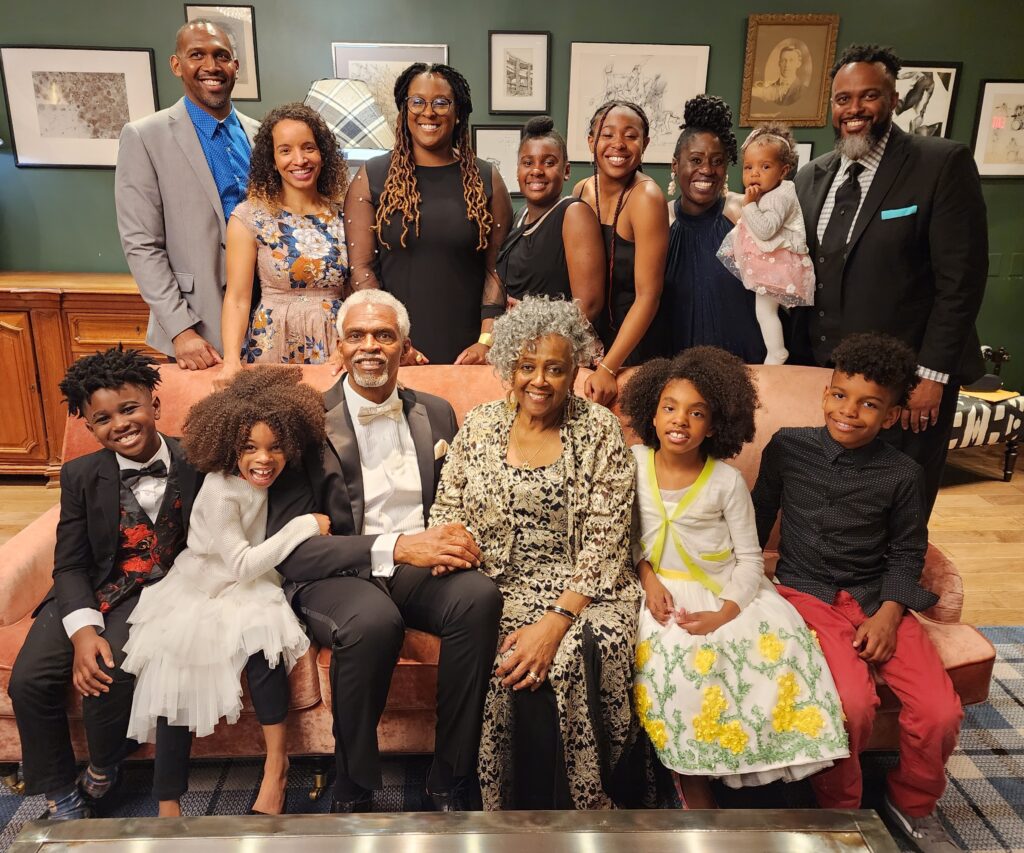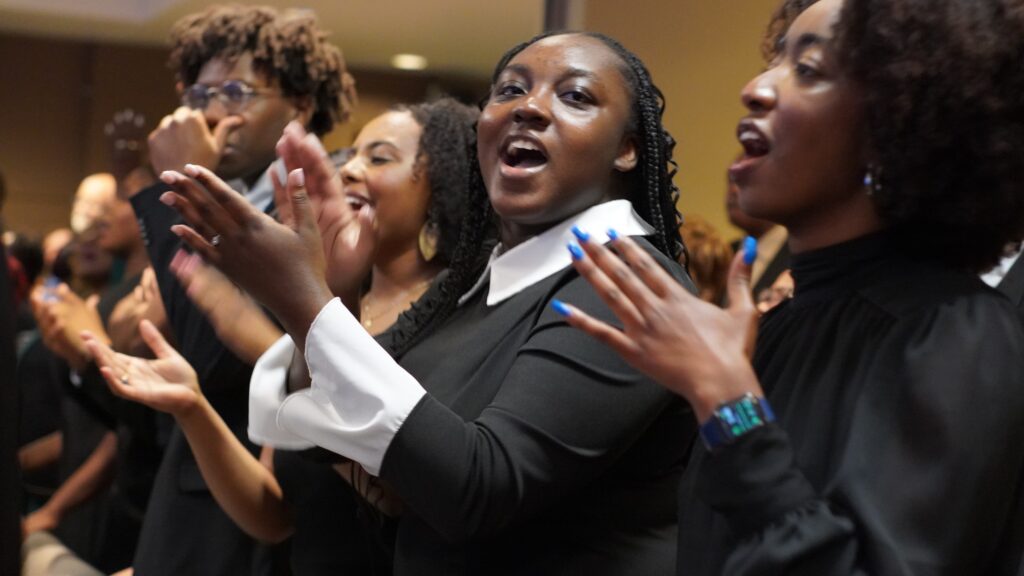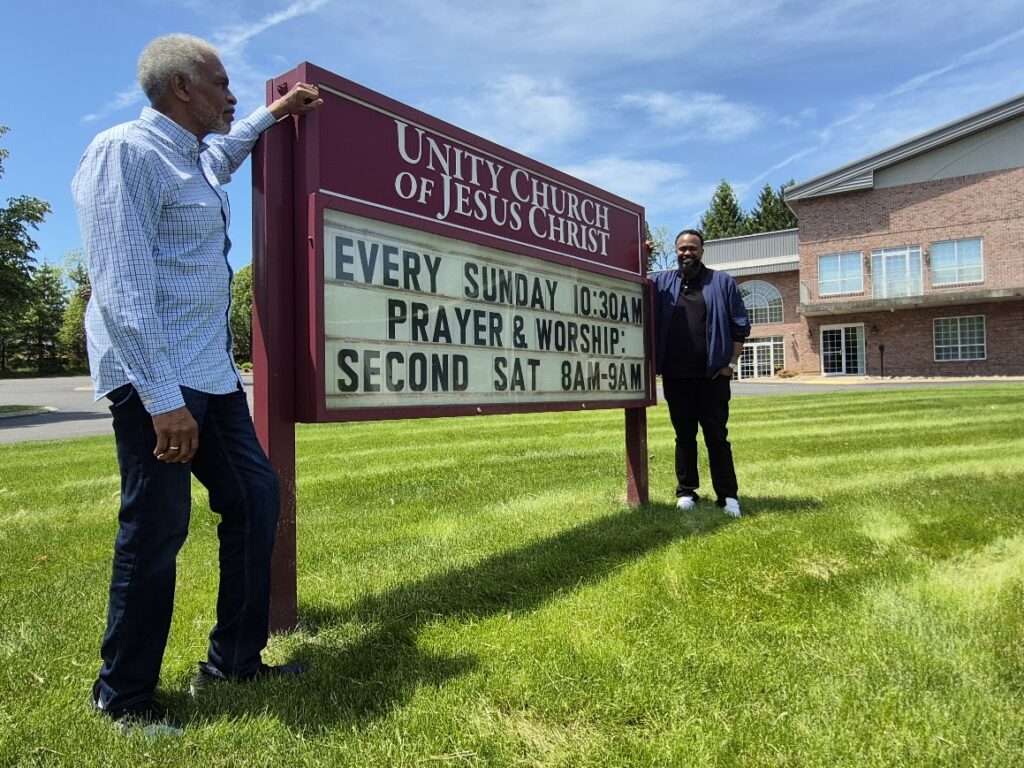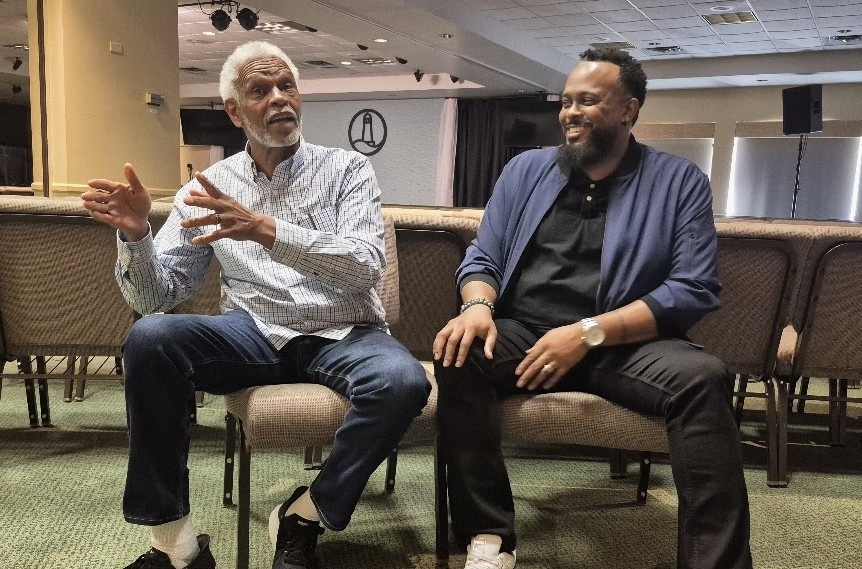A shift in pastoral leadership can be as unsettling to a church congregation as a transition from one ship’s captain to another. But when Unity Church of Jesus Christ in State College underwent a recent change at its helm there were few concerns, if any, and certainly no distress signals.
Pastor Harold McKenzie has stepped aside after serving as the church’s senior pastor for 35 years. But the loss of all that experience will not be as unsettling as it otherwise could have been.
Not only will Pastor McKenzie continue to serve the church in a less formal way, but his own son, Ephraim McKenzie, is now filling the seat as lead pastor. The younger McKenzie grew up within the church and, in fact, he began playing drums for services when he was 5 years old. Thus, he knows both State College and the congregation well. He also has experience from serving with Grace Church in Dumfries, Virginia, where he handled a wide variety of administrative and musical tasks. And for the last four years, he performed many of those same duties as Unity’s executive pastor.
Having interviewed both pastors for a 2023 story, I was pleased to sit down with them last week for another conversation. This time we focused on the father-to-son leadership change for the congregation that began in the 1970s as a Black church and now aspires to be truly multi-cultural. Our discussion began with their comments about May 3, the big day when Unity Church saluted Pastor Harold for his decades of service and installed Pastor Ephraim into his new role.
What was the highlight of the May 3 festivities?
Ephraim: I think it was the people. I was thinking about all of this and there were so many people from different key times in our lives from my childhood to people we’re close with now. So the opportunity to cross this threshold with people that I love was probably the highlight for me.
What was the most memorable part of the program?
Ephraim: Probably the part I was looking forward to the most was when all of the pastors and the leaders who were here prayed over myself and my wife. I know I cannot do any of what’s ahead on my own. So the ability to receive prayer from people who have been where I’m going really mattered to me.

Was there a particular comment that you’ll never forget?
Ephraim: It wasn’t something that was said to me but to my wife, Shani. Her father was giving remarks from the platform, and he talked about how she didn’t come home from Penn State with just a degree, but she came home with a boyfriend. And it was absolutely hilarious. He said something like, “You came home for the summer break, but you came home with a little bit of baggage.” She’s from Staten Island, New York, and her family is Caribbean. So family connections with those from Caribbean descent are typically deep. It means a lot that we are so connected with their family.
Pastor Harold, what was the highlight of May 3 for you?
Harold: I think the key moment for me was when we brought Ephraim and Shani to the platform to pray over them, to actually ordain them. That was the culmination of a journey that I’m sure we’ll talk about more in this interview. But for me, it was very emotional to get to that point.
And it was a blessing to see the people who took time to come. You don’t realize in what ways God impacts people’s lives through what he calls you to do. There was a young lady who had come from San Diego, California. She had been a part of the campus ministry choir that was connected to the church— 20 to 30 years ago, something like that.
Ephraim: With the university connection, students are here and we have the honor of ministering for a short time. But then they go away. One young man drove from Detroit just to share how he was blessed here through the things God did in his life and he wishes he had taken greater advantage of the ministry while he was here. After the service, he got in his car and drove back to Detroit, but for him to do that spoke volumes to the impact this church made on him.
Pastor, what were your primary emotions during the day of Ephraim’s installation?
Harold: It was like pouring water on a big puddle. But for all of this I am extremely grateful to the Lord. I know what God has done. And then that he would bring our kids back, speaking specifically of Ephraim and Shani and the honor of having your son take your place. One of the most amazing things is how God orchestrated the details and the timing for this.

Maybe you could tell me how this pastoral transition came about.
Harold: Well, although we had a foundation of wanting to love and serve God, Sherren and I didn’t have any idea that this (State College) would be where we would be pastoring. And there’s a long story in how that happened. But regarding Ephraim, Sherren and I got married in 1972 and we began to connect with this church, which was just a choir and house-to-house Bible study. The birthing place of Unity Church of Jesus Christ was a choir (“United Soul Ensemble”) on the Penn State campus. But revival was happening, so then there were Bible studies, and then ministry on campus and then the church on Gill Street and finally here (since 2018 the church has been meeting at 2280 Commercial Boulevard.)
As I told you several years ago, we were still living in Lock Haven in 1974, and God began sending dreams and prophetic moments to Sherren saying, “You are pregnant.” He didn’t say, “You’re going to be pregnant.” He said it in the present tense. And he said, “You are going to have a son.” Then in another dream, he said, “His name is Ephraim because he will be doubly fruitful.” But then nothing happened.
Well, for nearly six years, we went through a journey, and God kept saying it—“You are pregnant”—and other people were also getting this message for Sherren. And again, nothing happened. But by this time in the journey, she was just believing God. Then she started cramping and that’s when the doctor said, “We’re just going to do this procedure to clear everything out and you’ll be fine.” And she said, “No, I want to have a pregnancy test.” And she got the test and the doctor said, “You are pregnant and the things you’re feeling are the reactions of your uterus.” Then, in August of 1980, Ephraim was born. So it was a journey of faith, a wonderful journey of faith.
When we spoke in 2023, you mentioned how God can use the present tense for something that hasn’t yet happened because he is in control and knows it will happen.
Harold: Yes, God said to Abraham in Genesis 17:5, “I have made you the father of many nations,” and that was before Abraham’s son had even been born.
Ephraim: And if God is outside of time, he’s not relegated to time. So if God said it’s done, it doesn’t matter if it’s 10 years from now or right now, to God it’s already done. And so I think that’s the principle, and I think that’s what faith is really all about.
Harold: And the most amazing thing is God saw all this way back in 1974, and he had a plan and his plan was working in us. God knew that Sherren and I would be a key part of the journey of this church. And then he knew that at this stage the time for me and Sherren to lead the ministry was coming to an end. So his timing was perfect. If God had brought Ephraim forward when he spoke it to us in 1974, then he would not have met his wife, Shani, God’s partner for him and a wonderful, wonderful woman. And he would’ve been older when we reached this situation and it probably wouldn’t have worked out for him to lead Unity Church. So I’m amazed and blessed at how God put these pieces together for this moment. He knew what he was doing, even though all we knew was just to walk with him.
I’ve heard lots of stories about PKs (Pastor’s Kids) and many of them are little rascals. Pastor Ephraim, what would you say about your own PK experience?
Ephraim: Well, I started playing drums in the church at about 5 years old.
You were 5?
Ephraim: Yeah, I probably wasn’t any good, but they were patient with me. But from a young age, I was involved, and so I felt connected. And that never really stopped. There was something about being connected that way that made me care about what happens in the church—the character of it, the authenticity of it. Of course, I was a kid and I went through various phases, but I think at the core of my being, I was always being prepared to serve God. Walking into the lead pastor role is not necessarily something that I sought after, but there was always a propensity to be involved in ministry.

What were the things about the pastorate that attracted you? What are the things that might’ve pushed you away?
Ephraim: I think if you’ve been close to pastoring, it’s not something you clamor after. Or at least if you’ve been close to pastoring the right way with integrity and character. If you’re thinking, “Oh, I want to be the special guy,” you probably don’t understand what shepherding is really about. And so I think I was close enough not to chase after it.
I’m sure you saw many situations where your dad sacrificed greatly for the ministry. And maybe you thought you wouldn’t want to do that?
Ephraim: Yes, I think of when he was bi-vocational. It wasn’t just that he was bi-vocational. It was the type of job he had to do. He worked for Columbia Gas and there would be Saturday nights when he would have to go fix a leak, maybe dig holes all night, and then come straight home, put his suit on for church and be effective. It was only by the grace of God that he could do that, but it made me respect him so much more. And then I remember the day that he announced he was going full time (in the pastoral ministry), and I just sat there and cried because I saw firsthand how difficult this could be at times.
What were some of those difficulties?
Ephraim: Well, those crazy stories you hear about pastors…people showing up at their home at three in the morning and wanting help. Or people throwing rocks through our windows, those types of things. And so for me, it wasn’t just the crazy stuff but it was watching my parents deal with those things while also trying to hear from God and be a blessing to people.
And people really did throw rocks through your windows? Was that here in State College or when your family was living and ministering in Williamsport?
Ephraim: Here.
Do you have any idea what precipitated that? Was it a racial thing?
Ephraim: No, no. At the risk of sounding a little weird, there were some symbols—Satanic symbols—drawn on the rocks.
Pastor Harold, did you see any early foreshadowings in Ephraim that he would become a pastor?
Harold: Oh, I think he’s always been a caring person. But he was a kid just like other kids, and he did the things that kids do. I think the things that stood out first were creative, his giftings in the area of music. And the great thing was not only did his music talent begin to grow, but it began to expand. So now he’s a very accomplished keyboard player. One of the proudest moments for me was when their church in Virginia recorded an album, and most of the songs were written by Ephraim.
But his attitude wasn’t like, “I did this.” It was more like, “God, look at what you helped me do.” Our goal as a family was not just to raise healthy children and develop their talents. Our goal was that our children would walk with and know and serve the Lord. So when I say that we’re very proud of Ephraim, that’s because of his heart for God and his desire to serve God.
Ephraim, you were a State College kid, just like me except 30 years later. Did you follow the typical mold for a townie kid? Were you a Penn State football fan? Were you a State High basketball player? Did you deliver papers for the Centre Daily Times?
Ephraim: Yeah, literally everything you just said really happened in my childhood. So at one point he (his father) was delivering papers, and I would help him deliver papers. I played basketball for State High and I’m a Penn State football fan. Growing up here, I tried not to just do what everybody else was doing, but I can’t help it. As for playing sports, I think more of my life then had to do with being an athlete than even being in church. Baseball and basketball were my two main sports.
I tried to make it clear to people that I was really living for God. But I had a year, maybe eighth or ninth grade, when I got tired of being the goody-goody. And so I decided to use every swear word I could. But the thing that snapped me out of it was when a kid who cursed asked me why I cursed so much. That was like cold water in the face. The fact that he was a kid that cursed and he would ask me that question. So I was like, “I think I’ve maybe gone too far, crossed the line a little bit.” I think God was showing me that you don’t necessarily have to fit in with everything.
Was the racial environment in State College mostly good or mostly bad? I’m thinking this is an educated community, so it should have been fairly good.
Ephraim: I would say that I had a mixture of both. I don’t think it was all bad or all good. I will say even now, having moved my kids back here from Virginia, they had seen more bad experiences, more racially volatile situations, in their first two years here than in our 13 years in Virginia. So as progressive as State College has become, a lot still has not changed. I’m not complaining or saying everything’s bad because we have many good relationships. But there are things that still need to change.
Ephraim, I understand that your wife is a very gifted person. What role will she play in the church?
Ephraim: We both see it as stepping together into leading this church. Of course, I am officially the lead pastor of the church, but she’s not just in the background supporting me. She is an amazing, gifted person, and she’s done extensive work with a ministry that reaches moms and daughters around the world. She walks through the door with a level of spiritual prowess, and she’ll be beside me rather than just a support.
What ministry organization does she work with?
Ephraim: It’s True Girl, a ministry of Pure Freedom which is based right here in State College. It’s led by Dannah Gresh and her husband, Bob, who is also the head of Grace Prep High School.

Tell me more about your father. In what ways is he a tough act to follow?
Ephraim: I think to many people, Pastor McKenzie is known as “State College’s Pastor.” But to me, the remarkable thing is not the range in which he has earned that title. It’s more about the way he and my mother have shepherded and cared for people. And not for the last five or 10 years. We’re talking about more than 35 years that they’ve helped heal and restore people. At the same time, during some of the most tumultuous times in our community he has stepped up and been a peacemaker. He’s been a leader and found solutions where there was only division and difficulty and hurt and harm. And that’s beyond all the normal things in ministry like preaching.
Harold: I’m not trying to be ultra-religious, but it’s about what God has done through us. When we assumed leadership, the church was hurting, in crisis. And God, just by his grace, brought healing. Today, our church is a place where if you’re broken, you can find healing.
But now what we are so excited about is knowing that it was time to step down. That wasn’t a negative thing, but it was a realization. God had blessed us to bring Unity Church to this level. But we believe with all our hearts that God wants to use Ephraim and Shani for the church to grow to the next level. I’m not talking about just numbers, I’m talking about spiritual life and positive impact in the community. God has brought generations through here, but now there’s a younger generation, and the young folks flock to Ephraim and Shani. They’re like magnets for young people. I’ll be 74 at the end of this month and even though I want to relate to younger people, it’s like trying to catch bubbles in the air.
Ephraim, in addition to emphasizing outreach to young people, what else can you contribute to the church’s ministry?
Ephraim: I’d like to strengthen us organizationally. Some may not see administration and operations as spiritual, and it’s not just systems for systems sake, but often these are the things that help us sustain effective ministry to those in need–which is what we are ultimately after.
Pastor Harold, what is the very most important word of guidance that you’ve offered to this new pastor who happens to be your son?
Harold: Go after God, don’t go after the ministry. Even if you have a noble reason, don’t go after the things of ministry—“I want to be a better pastor, I want to be a better preacher, I want to be a better counselor.” If you make God the priority, he will give you everything he wants you to have and everything you need.



